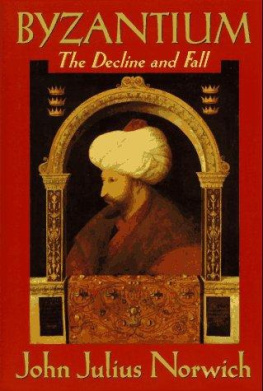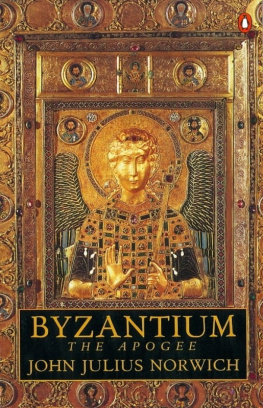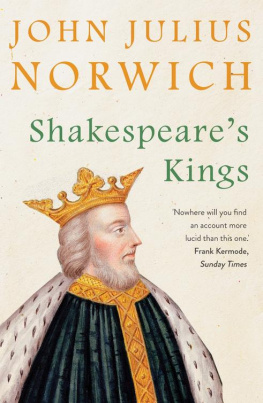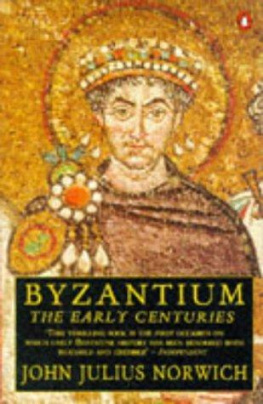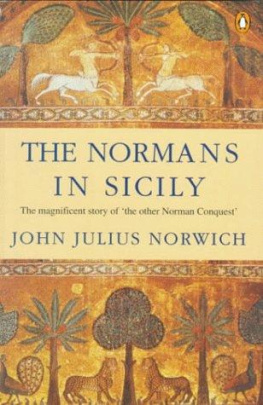John Julius Norwich - Byzantium, Volume 3: The Decline and Fall
Here you can read online John Julius Norwich - Byzantium, Volume 3: The Decline and Fall full text of the book (entire story) in english for free. Download pdf and epub, get meaning, cover and reviews about this ebook. year: 1995, publisher: Viking, genre: Detective and thriller. Description of the work, (preface) as well as reviews are available. Best literature library LitArk.com created for fans of good reading and offers a wide selection of genres:
Romance novel
Science fiction
Adventure
Detective
Science
History
Home and family
Prose
Art
Politics
Computer
Non-fiction
Religion
Business
Children
Humor
Choose a favorite category and find really read worthwhile books. Enjoy immersion in the world of imagination, feel the emotions of the characters or learn something new for yourself, make an fascinating discovery.
- Book:Byzantium, Volume 3: The Decline and Fall
- Author:
- Publisher:Viking
- Genre:
- Year:1995
- Rating:3 / 5
- Favourites:Add to favourites
- Your mark:
- 60
- 1
- 2
- 3
- 4
- 5
Byzantium, Volume 3: The Decline and Fall: summary, description and annotation
We offer to read an annotation, description, summary or preface (depends on what the author of the book "Byzantium, Volume 3: The Decline and Fall" wrote himself). If you haven't found the necessary information about the book — write in the comments, we will try to find it.
John Julius Norwich: author's other books
Who wrote Byzantium, Volume 3: The Decline and Fall? Find out the surname, the name of the author of the book and a list of all author's works by series.
Byzantium, Volume 3: The Decline and Fall — read online for free the complete book (whole text) full work
Below is the text of the book, divided by pages. System saving the place of the last page read, allows you to conveniently read the book "Byzantium, Volume 3: The Decline and Fall" online for free, without having to search again every time where you left off. Put a bookmark, and you can go to the page where you finished reading at any time.
Font size:
Interval:
Bookmark:
JOHN JULIUS NORWICH
BYZANTIUM
* * *
The Decline and Fall
VIKING
VIKING
Published by the Penguin Group Penguin Books Ltd, Wrights Lane, London w8 jtz , England Penguin Books USA Inc., Hudson Street, New York, New York 10014, USA
Penguin Books Australia Ltd, Ringwood, Victoria, Australia Penguin Books Canada Ltd, Alcorn Avenue, Toronto, Ontario, Canada M4V 3B2 Penguin Books (NZ) Ltd, 182190 Wairau Road, Auckland 10, New Zealand
Penguin Books Ltd, Registered Offices: Harmondsworth, Middlesex, England
Copyright John Julius Norwich, 1995 The moral right of the author has been asserted
All rights reserved. Without limiting the rights under copyright reserved above, no part of this publication may be reproduced, stored in or introduced into a retrieval system, or transmitted, in any form or by any means (electronic, mechanical, photocopying, recording or otherwise), without the prior written permission of both the copyright owner and the above publisher of this book
Filmset in 11/1 3pt Garamond Typeset by Datix International, Bungay, Suffolk Printed in Great Britain by Clays Ltd, St Ives pl c
A CIP catalogue record for this book is available from the British Library
ISBN 0-670-82377-5
Contents
List of Illustrations vii
Acknowledgements xxxi
Introduction xxxiii
A Note on Names and Transliteration xxxvii
The Rise of Alexius [1081]
The Normans [1081-91 ]
The First Crusade [1091-1108]
Alexius - The Last Years [1108-18]
John the Beautiful [1118-43]
The Second Crusade [1143-9] ^
Realignments [1149-58]
Manuel Comnenus - The Later Years [115 8-80]
Andronicus the Terrible [ 1180-8 5 ]
The Fall of Jerusalem [1185-98]
The Fourth Crusade [1198-1205]
The Empire in Exile [1205-53] l8
The City Recovered [125 3-61 ]
The Angevin Threat [ 1261-70]
The Uncertain Unity [ 1270-8 2]
The Catalan Vengeance [1282-1311] 5^
The Two Andronici [1307-41]
Civil War [ 1341-7]
The Reluctant Emperor [1347-54]
The Sultan's Vassal [1354-91]
The Appeal to Europe [1391-1402]
The Legacy of Tamburlaine [1402-25]
2 3. Laetentur Coelil [142 5-48]
24. The Fall [1448-53]
Epilogue
List of Emperors
The Despotate of Epirus
List of Muslim Sultans 45 3
List of Popes
Bibliography 45 5
Index
Acknowledgements
My thanks, as always, to the staff of the London Library, without whose unfailing help and sympathy this book and its two predecessors could never have been written. I also owe a particular debt of gratitude to Judith Flanders, for her eagle eye, computer memory and flawless ear for the rhythm of language; and to Douglas Matthews, for compiling yet another immaculate index.
Introduction
It was on the day or rather the night of the 27th of June 1787, between the hours of eleven and twelve that I wrote the last lines of the last page in a summerhouse in my garden. After laying down my pen, I took several turns in a berceau or covered walk of Acacias which commands a prospect of the country, the lake and the mountains. The air was temperate, the sky was serene; the silver orb of the moon was reflected from the waters, and all Nature was silent. I will not dissemble the first emotions of joy on the recovery of my freedom and perhaps the establishment of my fame. But my pride was soon humbled, and a sober melancholy was spread over my mind by the idea that I had taken my everlasting leave of an old and agreeable companion, and that, whatsoever might be the future date of my history, the life of the historian must be short and precarious.
So wrote Edward Gibbon, describing the moment when he finally completed The History of the Decline and Fall of the Roman Empire. Let no one think that I should dream of comparing my own modest attempt to tell the story of Byzantium with the greatest historical masterpiece of English literature; but it happens that after I typed the final full stop to this trilogy, at precisely 11.30 on a sultry July evening, I too walked out alone into a moonlit garden. And though I cannot pretend that my view was as spectacular as Gibbon's - or that I ever contemplated the establishment of my fame - I found that I could share at least one of the emotions that he describes. Now that my work is done I too feel that I am saying goodbye to an old and valued friend.
The first part of this trilogy told the story of the Empire of Byzantium from its foundation by the Emperor Constantine the Great on Monday, 12 May 330 ad , to the establishment of its imperial Christian rival, the Holy Roman Empire, with the coronation of Charlemagne on Christmas Day, 800. The second followed its fortunes through the dazzling dynasty of the Macedonians to the apogee of its power under the terrible Basil II Bulgaroctonus, the Bulgar-Slayer, but ended on a note of ill omen: the first of the three great defeats of Byzantine history, suffered at the hands of the Seljuk Turks at Manzikert in 1071. This third and last volume shows just how fateful that defeat was to be, robbing the Empire of most of Asia Minor - the principal source of its manpower - weakening it and impoverishing it to the point where, rather more than a century later, it was powerless to resist the onslaught of the Fourth Crusade. The fifty-six years of Latin rule that followed, ending with the triumphant return of Michael VIII Palaeologus, seem at first sight to have been little more than an unedifying interlude; in fact they proved to be the second blow from which Byzantium never recovered. The story of the Empire's last two centuries, seen against the background of the growing power of the Turkish House of Othman, is one of helpless decline and makes, I fear, occasionally painful reading. Only the final chapter, tragic as it is, once again lifts the spirit as all tales of heroism must inevitably do.
In the Introduction to the first of these volumes I mentioned how forcibly I had been struck by the difference, from the point of view of a writer, between the history of the Byzantine Empire and that of the previous object of my attention, the Republic of Venice. As the centuries pass, these two histories become ever more intertwined, both before and after the tragedy of 1204 -5, with the Serenissima becoming guilty of what might almost be described as a second betrayal - this time by apathy - in the final years of the Empire's existence; and it consequently seems worth while to press the comparison a little further. At first glance, the two have much in common. Venice was after all the child of Byzantium, and spent her formative years as a Byzantine colony, with all her early cultural influences coming directly from Constantinople. Both mother and daughter were of such beauty and opulence as to become legends fabled across the world as cities of marble and malachite and porphyry, reputations so near the truth that many, seeing them for the first time, declared in amazement that the half had not been told them. Both endured for well over a thousand years - a period comfortably longer than that which separates us from William the Conqueror. Both, on occasion, wielded immense political power, and gained for themselves sinister reputations - deserved or not for cruelty, duplicity and intrigue. Finally, both lasted too long and were obliged to suffer a slow and humiliating decline.
But there the similarities end. Venice was a republic, and although technically an oligarchy was in fact a good deal more democratic than any other nation - with the arguable exception of Switzerland - in the world; God-fearing in her way, she was throughout her history resolutely opposed to any interference of the Church in her internal affairs, braving more than one papal interdict in consequence. Byzantium was somewhere between an autocracy and a theocracy, absolute power being vested in an Emperor who was himself the representative of the godhead on earth - isapostolos, the Equal of the Apostl es. Venice was materialistic, hard-faced, down-to-earth; Byzantium was the most spiritually-orientated temporal state the Christian world has ever known, the Holy See not excluded. Venice, set amid the still, shallow waters of her lagoon, enjoyed a physical security unique in continental Europe; Constantinople lived under almost perpetual threat of attack. In her last, sad centuries, Venice gave herself over to the pursuit of pleasure and a degree of mild debauchery, finally surrendering to the young Napoleon in the most humiliating circumstances conceivable, firing not a single shot in her own defence. Byzantium, on the other hand, kept her soul intact. Three times in the last two hundred years, her Emperors sought to buy security by submitting her Church to Rome; but the people of Constantinople never wavered from their ancient and traditional faith. And when their time came they fought to the end for fifty-five desperate days, ten thousand against a quarter of a million, their last Empe ror dying heroically on the battl ements as the city's defences, so long believed impregnable, finally collapsed around him.
Font size:
Interval:
Bookmark:
Similar books «Byzantium, Volume 3: The Decline and Fall»
Look at similar books to Byzantium, Volume 3: The Decline and Fall. We have selected literature similar in name and meaning in the hope of providing readers with more options to find new, interesting, not yet read works.
Discussion, reviews of the book Byzantium, Volume 3: The Decline and Fall and just readers' own opinions. Leave your comments, write what you think about the work, its meaning or the main characters. Specify what exactly you liked and what you didn't like, and why you think so.

